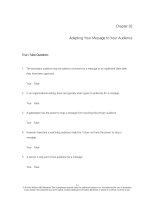Business communication building critical skill 3rd by locker module 22
Bạn đang xem bản rút gọn của tài liệu. Xem và tải ngay bản đầy đủ của tài liệu tại đây (407.04 KB, 11 trang )
PPT
PPT
Module
Module 22
22
Finding,
Finding,Analyzing,
Analyzing,
and
andDocumenting
Documenting
Information
Information
McGraw-Hill/Irwin
©2007, The McGraw-Hill Companies, All Rights
22-2
Finding,
Finding, Analyzing,
Analyzing, and
and
Documenting
Documenting Information
Information
To learn how to
Find information online and in print.
Write questions for surveys and
interviews.
Analyze information.
Use the Internet for research.
22-3
Proposals
Proposals and
and Progress
Progress
Reports
Reports
Start by answering these questions:
How can I find information online and
in print?
How do I write questions for surveys
and interviews?
How do I decide whom to survey or
interview?
How should I analyze the information
I’ve collected?
How should I document sources?
22-4
Types
Types of
of Research
Research
Primary
Gathers new information.
Includes surveys, interviews, and
observations.
Secondary
Retrieves published information.
Includes library research and online
searches.
22-5
Electronic
Electronic Research
Research Sources
Sources
Databases
Black Studies on Disc
Handbook of Latin American Studies
LEXIS/NEXIS Services
Newspaper Abstracts
Peterson’s College Database
Women’s Resources International
22-6
Web
Web Research
Research Sources
Sources
Britannica Online
Business Week
(Online)
International
Business Kiosk
The WWW Virtual
Library
U.S. Census
(Online)
22-7
Print Research
Research Sources
Sources
Indexes
Business Periodicals Index
Facts, Figures, and Forecasts
Moody’s Manuals
U.S. Census Reports
Census of Manufacturers
International Business &
Government
Dun and Bradstreet’s Principal
International Businesses
22-8
Surveys
Surveys and
and Interviews
Interviews
Surveys question many people.
Interviews are structured conversations
with someone.
When asking questions
Use phrasing that doesn’t bias the response.
Avoid questions that make assumptions about
your audience.
Use words that mean the same thing to you and
your audience.
22-9
Types
Types of
of Questions
Questions
Open
Do not lock the subject into any sort of
response.
How could we improve service to you?
Closed
Have a limited number of possible
responses.
What is your date of birth?
Branching
Direct different respondents to a different
part of the questionnaire.
2210
Types
Types of
of Samples
Samples
Random
Each person in a population has an
equal chance of being selected.
Convenience
Respondents are easy to get.
Judgment
Respondents have views which
seem useful.
2211
After
After You
You Collect
Collect Data
Data
Understand the source of the
data.
Analyze numbers.
Analyze words.
Check your logic.
Document sources.
Use MLA or APA Format.









